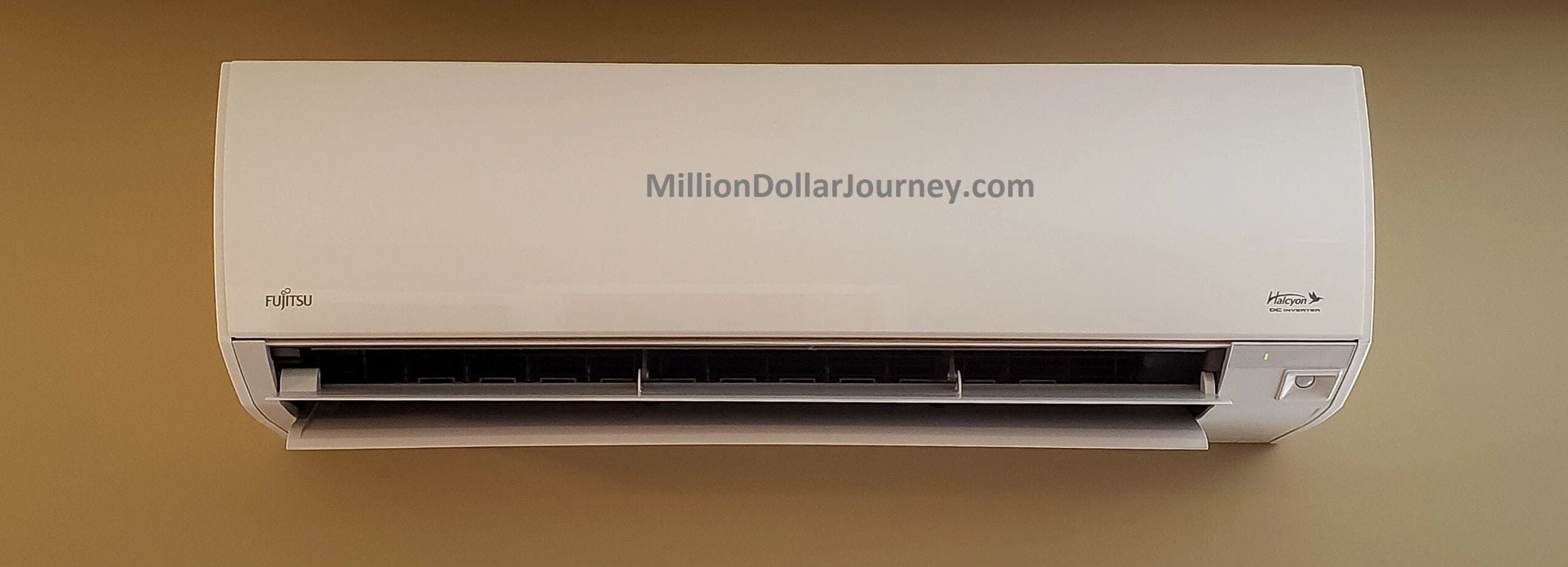Will a Mini-Split Heat Pump Save You Money? Our Results After the first Year!
In late 2018, we installed a mini-split heat pump for the purpose of reducing our electricity bill. Around here in the most easterly parts of Canada, most of the houses use electric baseboard heating as the primary source of heating.
While baseboard heating is a lower cost option during installation, the operating costs can rack up quickly during the colder winter months. Combine this with rising electricity rates (cough.. Muskrat Falls.. cough), a 3,000 sq ft house can face winter heating bills from $600 to $1,000/month.
What is a Mini-Split Heat Pump?
Before I get into the merits of a mini-split – what exactly is it? It’s essentially a heat pump that has an outside unit and an inside register (like the picture above) that’s usually on an exterior wall.
In the winter, the units will extract any warmth in the air (will be less efficient the colder it gets), and expel it the inside of your home. In the summer, the AC will extract heat (and moisture) from the inside of your home and expel outside (while also blowing cold air inside). From my research and talking to people with mini-splits, the energy savings works out to be between 15%-35%
The beauty of mini-splits is that you do not need additional ductwork, but the downside is that it’s only meant to heat one space/room per unit. The ideal situation for a mini-split is an open concept area that is used as the main area in the house. Oh, and you’ll also need to wrap your head around the size of the inside register. Some of the biggest concerns are the “look” of the unit, which turns out to be not that big of a deal (at least to me!).
In early 2019, I posted the results in having a mini-split installed for the first few months of the year. The results were promising, but it only gave details of the initial progress.
One gap in the initial findings is that it didn’t include summer months. A typical house in NL does not have air conditioning due to practicality, so the energy usage is typically lower during the summer.
One of the major benefits of a mini-split is that is has a split personality. In the winter, it can provide efficient heat, and in the summer, it can provide air conditioning. While summer in NL is not exactly heat-wave caliber, the humidity can get stuffy at times in which an air conditioner would provide some comfort.
We did find that we used the air conditioning feature for a handful of days during July, but nothing like using the heat option during the winter which is on 24/7.
Now with a full year’s worth of data, let’s take a look to see if the savings rates kept up to the initial findings.
Energy Usage Comparison – Electric Heat vs Mini-Split
| Date | Electric (kWh) | Temperature Diff | Normalized Electric (kWh) | Date | Mini Split (kWh) | Difference | Savings % |
| Sep 2017 | 915 | 0 | 915 | Sep 2018 | 1048 | -133 | -14.54% |
| Oct 2017 | 1132 | 0.035 | 1171.62 | Oct 2018 | 1096 | 75.62 | 6.45% |
| Nov 2017 | 1881 | 0.105 | 2078.505 | Nov 2018 | 1443 | 635.505 | 30.58% |
| Dec 2017 | 2787 | 0.14 | 3177.18 | Dec 2018 | 1903 | 1274.18 | 40.10% |
| Jan 2018 | 2548 | 0.105 | 2815.54 | Jan 2019 | 1784 | 1031.54 | 36.64% |
| Feb 2018 | 2489 | 0.245 | 3098.805 | Feb 2019 | 1864 | 1234.805 | 39.85% |
| Mar 2018 | 2525 | 0 | 2525 | Mar 2019 | 1567 | 958 | 37.94% |
| Apr 2018 | 1883 | 0.14 | 2146.62 | Apr 2019 | 1303 | 843.62 | 39.30% |
| May 2018 | 1567 | 0 | 1567 | May 2019 | 1145 | 422 | 26.93% |
| Jun 2018 | 1325 | 0 | 1325 | Jun 2019 | 917 | 408 | 30.79% |
| Jul 2018 | 798 | 0 | 798 | Jul 2019 | 825 | -27 | -3.38% |
| Aug 2018 | 923 | 0 | 923 | Aug 2019 | 714 | 209 | 22.64% |
| Total: | 20773 | 22541.27 | 15609 | 6932.27 | 30.75% |
As you can see from the numbers above, energy savings really becomes apparent during the winter months. The savings from December to April was in the 40% range, which is offset a little AC energy usage in the summer months.
In dollar value, a 6900 kWh savings equates to about $900 with an electricity rate of $0.133/kWh. The higher the rates, the higher the savings (as can be seen by the table below).
Cost of Electric vs. Mini Split Usage
| Price per kWh | Electric (kWh) | Normalized Electric (kWh) | Mini Split (kWh) | Difference | ||
| $0.133 | $2,762.809 | $2,997.989 | $2,075.997 | $921.992 | ||
| $0.150 | $3,115.950 | $3,381.191 | $2,341.350 | $1,039.841 | ||
| $0.170 | $3,531.410 | $3,832.016 | $2,653.530 | $1,178.486 | ||
| $0.200 | $4,154.600 | $4,508.254 | $3,121.800 | $1,386.454 | ||
| $0.220 | $4,570.060 | $4,959.079 | $3,433.980 | $1,525.099 |
In terms of pay off, I’ve calculated that the unit should pay for itself between 5-6 years. If rates jump to $0.17/kWh like many are expecting, then pay off is between 4-5 years.
Maximizing Savings
Note that not all mini-split installations will result in significant savings. It is important to make sure that your house is properly insulated, at least up to code (R50 attic installation in NL). More details in the original article.
Next, the location of the interior register is important. You want the air blowing out to replace as many electric baseboard heaters as possible. It turns out that the design of our house is ideal where the register can heat the main area of the house, but also blow out to the main foyer where it can heat the kid’s bedrooms at night.
The mini-split in our house replaces all of the heaters in the main area (family room + kitchen+living room), the foyer, and the kid’s bedrooms. As baseboard heaters use about 225W/ft of energy, the mini-split replaced more than 6,000W worth of baseboard heaters.
But also note that we often close off the living room, and certainly close off as many rooms as possible on the main floor during the night to maximize the heat flowing upstairs.
Final Thoughts
As mentioned above, the savings from installing a mini-split will depend entirely on the number of baseboard heaters that you replace. For us, we replaced at between 25-30 ft worth of electric baseboard heaters (~6kw) with a single mini-split running at less than 1.2kW. The cherry on top is that the house is more comfortable.
If you live in Eastern Canada, especially if you live in NL with the prospects of rising electricity rates, I would highly recommend a reputable and branded mini-split heat pump. However, before making the investments into a mini-split, I would recommend that you check to see if your insulation is up to code. Insulate first, then work on efficient heat sources.
I've Completed My Million Dollar Journey. Let Me Guide You Through Yours!
Sign up below to get a copy of our free eBook: Can I Retire Yet?
Latest Articles
- « Previous
- 1
- …
- 78
- 79
- 80




I live in Alberta and do not know what these “mini-split” pumps are. We heat our 1700 sq. Ft. Older home with natural gas and it costs from $30 in the summer (because we have a gas oven) to around $200 per month in the winter where many days are -30°C. So our natural gas costs are reasonable when figured on a monthly basis.
Our big problem, since we live on an acreage is the distribution costs of electricity, which are more than twice the cost of the actual power. Distribution costs keep rising and since we are seniors on fixed incomes, it is hard to budget for these increases.
I have talked to the management at our power company (who incidentally drive brand new trucks and make around $100,000 annually), suggesting a discount for seniors but they are “not able to do this”! I’m not sure if there is a solution to this, but I think we will have to sell our acreage and move into an old folks home. This costs way more for the gov’t than subsidizing our electric bill!
Sometimes gov’ts are not aware of these kinds of issues, and there doesn’t seem to be a way to get their attention. We cannot switch to another power company, because the distribution costs can only be done by the one company – so no saving there.
Governments are always saying one of their goals is to keep seniors in their homes, but as utility costs keep rising, we cannot keep paying more and more. Our pensions increase annually, however it is way less than the increase in utilities. I guess they want us to move into old folks homes, but I don’t believe they realize how many seniors will be unable to afford to live at home, there are not enough old folks homes to house the great flood of seniors coming up.
PS We love our acreage (which is paid for), we have a large garden, a clothesline, our own well, and it sure would be a sad day if the reason to sell it and move into subsidized housing is because we cannot pay our power bill!
I’ve got four mini splits running off two outdoor heat pump units in my 3,300 sf timber frame bungalow. Three small 9,000 btu units in 3 big bedrooms plus one huge 36,000 btu one in a 900 sf great room with vaulted ceiling. The are excellent units, very efficient and even though we have radiant in floor heating with an on demand propane water heater and high end glass lined water storage tank, the mini splits are way more efficient and I am using them more and more for heating, particularly nights and weekends when electric rates are lowest. Zero issues, zero mould and I just vacuumed the filters yesterday for the first time in 6 months but they barely needed it. Not a dusty house with no forced air furnace.
We initially installed them only for the air conditioning here in hot and humid Ontario so the heating was a great bonus I hadn’t really considered. First two units were installed in 2017 and loved them enough I had two more put in last summer.
I have a ductless AC/Heater on the 3rd floor. I rarely need to use it but on extra cold/hot days it evens out the temperature throughout the house. I still run the furnace at the same time. For those extreme temperatures it’s worth it. Or for days when I’m specifically doing something on the 3rd floor. But it was costly. Honestly, good insulation is also often a great alternative.
If you live in BC you can claim a rebate on these from BC hydro.
cant argue with a 30% savings but in terms of payback, how long will it take to cover the cost of installing the mini heat pump?
We are installed a high efficiency Fujitsu mini split system in Oct 2019 and we absolutely love it. The Fujitsu system is one of the top rated heat pumps also with 12 yr warranty. Prior we used a gas fireplace and baseboard heating. A few years back I enrolled in a Power Stream rate optimization program during the coldest winter. Our electrical bill spiked from $240 to near $500 month. One of the benefits of the mini split is the air flow which makes the house feel very comfortable. We have a 1200 sq ft house and the 2 head 27,000 BTU system is more than enough to keep the home cozy. I estimated the cost of operation about 15% better than gas fire place, which was our main heat source
For our back-split home. Highly recommend it.
Thanks MDJ, we’re planning on moving back to NL soon & our plan is to install 2-3? mini splits in our home. This really is great evidence to see that it does provide significant cost savings so thanks. Curious what brand, size & who did you go with for installation?
Hey John! I would recommend Fujitsu. However, if you are planning on installing 2-3 units, you may want to look into the cost of installing a full-fledged heat pump in your home.
MDJ, there is no ducting in the house so will have to be a number of minisplits.
Article says “For us, we replaced at between 25-30 ft worth of electric baseboard heaters (~6000kw) with a single mini-split running at less than 1.2kW.”
That doesn’t makes sense. Perhaps the author meant 6kw of baseboard heaters?
We have 10 years of experience with Mitsubishi air source heat pump in Eastern Ontario. These are high efficiency heat pumps compared with most mini-splits. They will still cut heating costs down to about -23C outdoor temperature. Over a typical winter, our heat pump has cut our heating electricity usage in half. Improved insulation has contributed to this. Because our system is ducted via attic, we do lose some heat to attic despite duct insulation. (ducts were existing A/C ducts. Our system has paid for itself, but it took almost 10 years. It has required no maintenance other that duct filters.
I don’t understand the tables showing savings in summer months. It must get cold on the east coast, even in summer! We actually use more power in summer, but only because the A/C works so much better than our old system did.
Typo! Fixed!
If it took 10 years to pay for itself, and the average life span of a heat pump is 10 years
Would you be looking to buy a new heat pump in the near future to start to process all over again, saving nothing?
Mini Splits are ideal for the mild climate of Vancouver Island. The colder it gets, the less heat they can produce, so a supplemental source of heat is advisable on the coldest days. The fact that they can also keep the place cool in summer sealed the deal for me.
I got six Daikin mini-splits in 2014, two each for our home and two each for two rental properties. They have a 12 year parts guarantee. Two failures so far, both circuit boards, about $600 in labour to repair, and had to wait a couple of weeks for the part to arrive from Toronto.
One thing I have found with our Min-Split is that as we use it for AC & Heating it will develop mold inside at some point so checking this at least yearly is a good idea. It will need a good cleaning by a professional to keep this in check. Other than that they are great and will save you money.
Thanks Brad. I talked to the installer about mold and he said that it’s often when people use AC, then turn it off when they are finished. He recommended to keep the unit on to keep the fan to make sure it dries out any moisture built up.